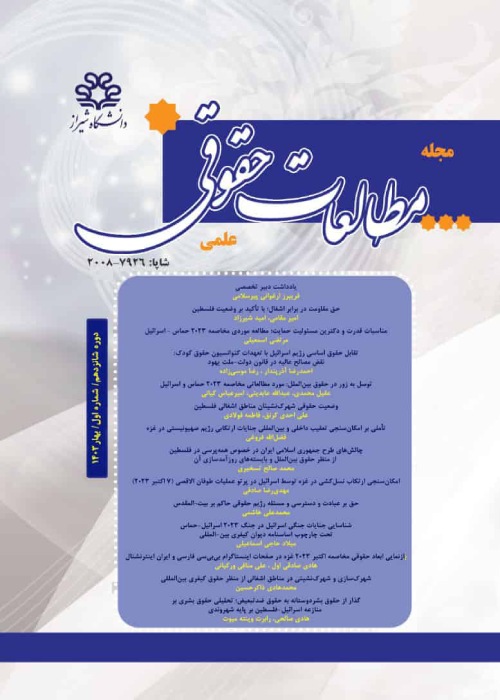Resorting to Force in International Law: A Case Study of Hamas and Israel's 2023 Conflict
The incendiary attacks by the Hamas group from the Gaza Strip on October 7, 2023, towards the border areas of Israel, known as "Operation Al-Aqsa Storm," and Israel's robust military response to these attacks once again brought the issue of the occupied Palestinian territories to the forefront of the world's media. These attacks involved a combination of terrestrial, aerial, and naval assaults, with thousands of rockets launched towards Israel, resulting in significant damage to Israeli positions, including the loss of approximately 1400 lives and the capture of 240 individuals. In response to Hamas' operations, Israel officially declared war one day later, expressing its intent to engage in military conflict to eliminate Hamas and end their control over the Gaza Strip. Subsequently, Israel launched forceful and disproportionate offensives against the Gaza Strip, resulting in numerous civilian casualties. As of December 9, 2023, the casualties from these attacks have exceeded a staggering 17,700 tons, as reported by the Palestinian Ministry of Health. It is also important to note the extensive destruction of numerous buildings caused by these attacks.
From an international legal perspective, a significant aspect of the military operation on October 7, 2023, is the legality of the military actions undertaken by both Hamas and Israel against each other. Hamas has portrayed its military actions, particularly the October 7 operation, as a response to Israel's presence as an occupying force, aligning with the Palestinians' right to self-determination. On the other hand, Israel justifies its actions and attacks on the Gaza Strip as acts of self-defense. Both parties consider their actions lawful based on these grounds, which they view as crucial justifications. This article aims to explore, through a descriptive-analytical approach, the international law perspective on the use of force in the October 7 operation and the military actions of Hamas and Israel against each other.
According to the statement issued by the United Nations Secretary-General following the attack, the lack of opportunity for Palestinians to exercise their right to self-determination prompted Hamas to initiate military action to create a conducive environment for such exercise. Considering the founding charter of Hamas and statements by its officials against the Israeli occupation, the decision to conduct military operations on October 7 can be justified under international law as a manifestation of the right to self-determination. While some scholars, legal experts, and countries like Israel and the United States may view Hamas' actions as terrorism, Hamas' distinct approach towards the occupying force sets it apart from terrorist organizations. Hamas has demonstrated a level of influence and effective control over the population it represents, even if not all Palestinians endorse its methods and political objectives. However, exercising the right to self-determination does not grant a group the freedom to choose the type, method, and means of military operations. Therefore, the evaluation of Hamas' armed operations targeting Israel should consider the requirements outlined in Additional Protocol I to the four Geneva Conventions (1977).
Regarding Israel's justification for military operations in response to the October 7 attack, the claim of legitimate defense is contentious. While it could be argued that if Palestine were recognized as a state by Israel and non-state actors like Hamas were capable of armed attacks, Israel would have the right to defend itself under Article 51 of the Charter, the reality is that Israel does not recognize Palestine as a state. The prevalent view in international law, including the Security Council, is that self-defense is not applicable when an occupying power controls another entity. Even if Israel's self-defense justification were accepted, the conditions, including proportionality, for justifying severe international crimes are not met.
Israel's reliance on Article 43 of the Fourth Hague Convention for self-defense to establish order and security in occupied territories is also questionable. As Israel's presence in the territory is temporary and lacks sovereignty, this provision cannot be invoked when the occupier faces the people's struggle for self-determination. The actions of the occupier must adhere to international human rights and humanitarian law, which prioritize the right to self-determination as a fundamental human right.
The designation of Hamas as a terrorist group by Israel does not hold legal weight in international law. The determination of a group as a terrorist organization is the prerogative of the United Nations Security Council, not individual countries. Even if a group resorts to intimidating tactics, it may still be considered a liberation group, especially if it actively opposes foreign occupation.
- حق عضویت دریافتی صرف حمایت از نشریات عضو و نگهداری، تکمیل و توسعه مگیران میشود.
- پرداخت حق اشتراک و دانلود مقالات اجازه بازنشر آن در سایر رسانههای چاپی و دیجیتال را به کاربر نمیدهد.


